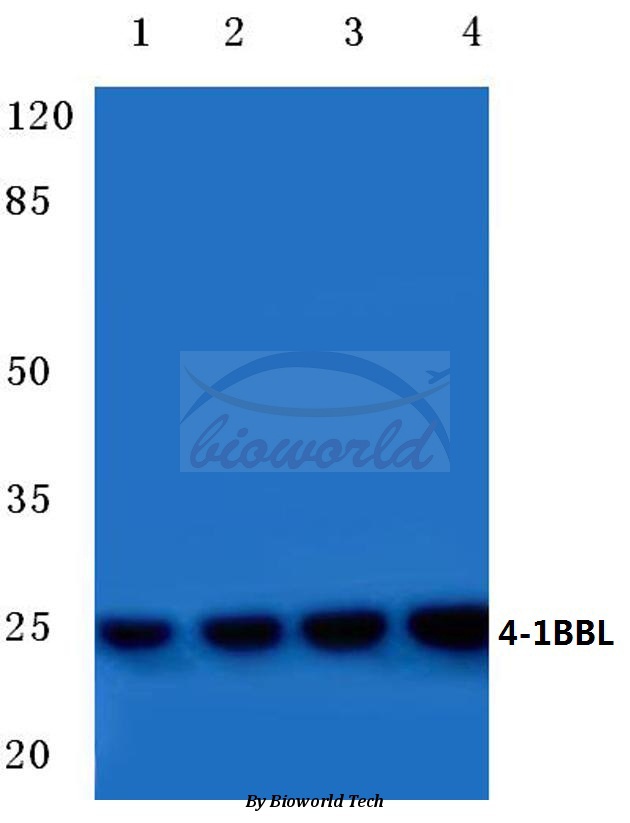Product Name :
4-1BBL (R69) polyclonal antibody Background :
4-1BB was originally described as a cDNA expressed by activated murine T cells and subsequently demonstrated to encode a member of the tumor necrosis factor receptor family of integral membrane proteins. Recently, a murine ligand for 4-1BB (mu4-1BB-L) was cloned and demonstrated to be a member of an emerging family of ligands with structural homology to tumor necrosis factor. Both monoclonal antibody to hu4-1BB and cells transfected with hu4-1BB-L induced a strong proliferative response in mitogen co-stimulated primary T cells. In contrast, ligation of 4-1BB on T cell clones enhanced activation-induced cell death when triggered by engagement of the TCR/CD3 complex. To reject tumors, T cells must overcome poor tumor immunogenicity and an adverse tumor microenvironment. It has been shown that primary human T cells expressing CD80 and 4-1BBL vigorously respond to tumor cells lacking costimulatory ligands and provoke potent rejection of large, systemic tumors in immunodeficient mice. Product :
Rabbit IgG, 1mg/ml in PBS with 0.02% sodium azide, 50% glycerol, pH7.2 Storage&Stability :
Store at 4°C short term. Aliquot and store at -20°C long term. Avoid freeze-thaw cycles. Specificity :
4-1BBL (R69) polyclonal antibody detects endogenous levels of Tumor necrosis factor ligand superfamily member 9 protein. Immunogen :
Synthetic peptide, corresponding to amino acids 50-100 of Human 4-1BBL. Conjugate :
Unconjugated Modification :
Unmodification
4-1BBL (R69) polyclonal antibody Background :
4-1BB was originally described as a cDNA expressed by activated murine T cells and subsequently demonstrated to encode a member of the tumor necrosis factor receptor family of integral membrane proteins. Recently, a murine ligand for 4-1BB (mu4-1BB-L) was cloned and demonstrated to be a member of an emerging family of ligands with structural homology to tumor necrosis factor. Both monoclonal antibody to hu4-1BB and cells transfected with hu4-1BB-L induced a strong proliferative response in mitogen co-stimulated primary T cells. In contrast, ligation of 4-1BB on T cell clones enhanced activation-induced cell death when triggered by engagement of the TCR/CD3 complex. To reject tumors, T cells must overcome poor tumor immunogenicity and an adverse tumor microenvironment. It has been shown that primary human T cells expressing CD80 and 4-1BBL vigorously respond to tumor cells lacking costimulatory ligands and provoke potent rejection of large, systemic tumors in immunodeficient mice. Product :
Rabbit IgG, 1mg/ml in PBS with 0.02% sodium azide, 50% glycerol, pH7.2 Storage&Stability :
Store at 4°C short term. Aliquot and store at -20°C long term. Avoid freeze-thaw cycles. Specificity :
4-1BBL (R69) polyclonal antibody detects endogenous levels of Tumor necrosis factor ligand superfamily member 9 protein. Immunogen :
Synthetic peptide, corresponding to amino acids 50-100 of Human 4-1BBL. Conjugate :
Unconjugated Modification :
Unmodification
Bioworld Biotech only provide peptides for our antibodies and do not provide additional peptide customization services.
Price/Size :
USD 368/1mg/vial
Tips:
For phospho antibody, we provide phospho peptide(0.5mg) and non-phospho peptide(0.5mg).Describe :
Blocking peptides are peptides that bind specifically to the target antibody and block antibody binding. These peptide usually contains the epitope recognized by the antibody. Antibodies bound to the blocking peptide no longer bind to the epitope on the target protein. This mechanism is useful when non-specific binding is an issue, for example, in Western blotting (WB) and Immunohistochemistry (IHC). By comparing the staining from the blocked antibody versus the antibody alone, one can see which staining is specific; Specific binding will be absent from the western blot or IHC performed with the neutralized antibody.Formula:
Synthetic peptide was lyophilized with 100% acetonitrile and is supplied as a powder. Reconstitute with 0.1 ml DI water for a final concentration of 10 mg/ml.The purity is >90%,tested by HPLC and MS.
Storage:
The freeze-dried powder is more stable. For short time at 2-8°C. For long term storage store at -20°C.
Note :
This product is for research use only (RUO only). Not for use in diagnostic or therapeutic procedures.
 4-1BBL (R69) polyclonal antibody
4-1BBL (R69) polyclonal antibody 
 Datasheet
Datasheet COA
COA MSDS
MSDS SHIP
SHIP